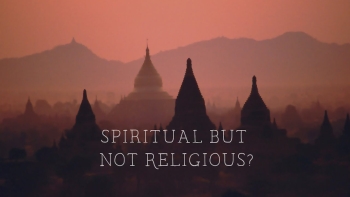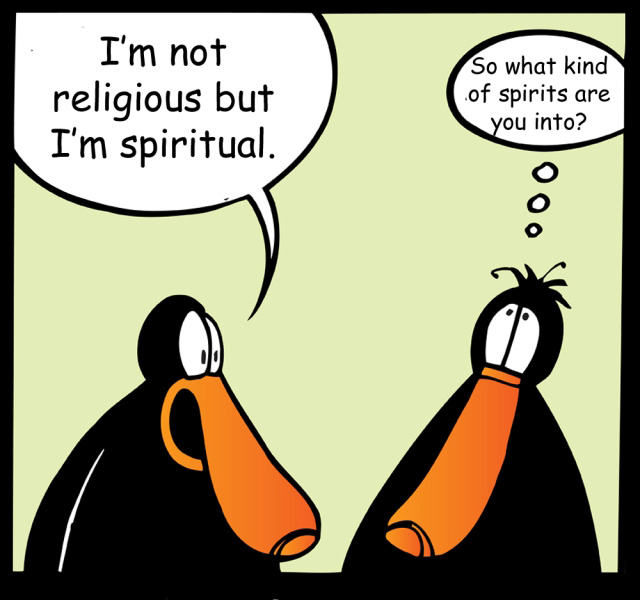 What does it mean to be spiritual but not religious? Is it to abandon all religious authority? Is it making your own cornucopia of religious beliefs? Do you have a community if you are spiritual but not religious? What about having a spiritual discipline, discernment, and moral values? What does it all mean? What is the path to peace, how do we establish a valid spiritual path for ourselves?
What does it mean to be spiritual but not religious? Is it to abandon all religious authority? Is it making your own cornucopia of religious beliefs? Do you have a community if you are spiritual but not religious? What about having a spiritual discipline, discernment, and moral values? What does it all mean? What is the path to peace, how do we establish a valid spiritual path for ourselves?
In an important way, we need to distinguish being religious from being spiritual, It might seem that one encompasses belief, doctrine and adherence to faith community norms. The other might be a state of being, or a state of encounter that supports being and awareness of self. These are tentative propositions, not strait-jacketed definitions. For there are as many ways of belief and spirituality as there are people. Why? We would tentatively venture to say that minds are different, and that family, society and culture have similar binding effects.
So to clarify, we might say that spirituality involves various forms of personal, subjective connection to something metaphysical or otherwise beyond the everyday superficial self, whereas being religious is more focussed toward connections between institution, belief, and ritual. Both are associated with meaning, values, and the sacred. Being spiritual but not religious does not mean you live without human values.
We might say that being spiritual but not religious is about believing without belonging. It might be a cafeteria form of believing where one selects from here and there where what is selected or chosen as a belief or approach to the sacred is validated by experience. There is an old saying,
Religion means experience. Religious teachings have to be put into practice and their validity tested.
Uncoupling from Religious Authority
If some teachings or doctrines do not work for you then you are free to look for something else that might fit you and your life-experience. No one obliges you to fit with what is written in this or that religious text or catechism. You are living your life, and it is up to you to find what connects you to the Divine.
Once religious authority is deserted, one is left with one’s own intuition, inner voice, or “alignment” to serve as the guide. Finally, in this ethos each person is responsible for his or her own liberation. To make this happen, each must tap into their own intuition, “magical” power, or energy. The result is freedom to live one’s life as one pleases. And even though “New Agers are averse to traditions, with their dogmas, doctrines and moralities”, they paradoxically assert that a hidden wisdom lies at the heart of all religions.
Intuition is inner-tuition
“I completely respect all religions, and all the reasons why people have religion … I think that religious people are spiritual people … I’m a spiritual person … I see things in all … different religions that work for me. But I don’t want to belong to any one thing cause I feel like I’ll put myself in a box … I want to expand in this life … I want to be open to whatever is supposed to be happening.” “Now … spirituality is just natural to me … I think my intuition is the Divine and … I just follow that … The result … is I have a really beautiful life. I mean, things happen that make me sad and stuff, but I still think my life is perfect … I don’t feel like I have to have any specific practice because … it’s every moment of my life, you know?” The only spiritual activities I can now identify are playing music and being out in nature. (spiritual seeker, aged 44)
Nature and Spiritual Experience
Since religion is often not considered as a source of spiritual experience, a large number of people, especially younger ones, speak of turning to nature as the resource for their spirituality, either blended with or in place of specific spiritual alternatives. Some consider nature the prime “sacred” dimension.
Nature-based spirituality seems to be an attempt to make a personal meaning out of an overwhelming sense of awe and wonder in the presence of the natural world, accompanied by a loosening of the grip of ego and a new sense of belonging, acceptance and union with the Divine.
Nature-based spirituality also offers a certain kind of comfort — not the comfort that comes from hope of heaven, or from collective worship of an agreed-upon deity in an agreed-upon way, but the comfort that comes from laying down the restless search for meaning, from finding a touchstone against which to measure one’s individual life. One can take rest from the regime of pray-pay-obey that comes with so many Western faith bodies.
Spiritual Practice and the Challenges of this Age
To be spiritual but not religious places the location of belief and authority, validation of experience within the individual. In this modern age we face many challenges to steadiness and inner peace. Many things happen beyond our control: violence and conflicts, challenges related to education and livelihood, systemic challenges in society such as the economy, inflation and cost-of-living issues. Social media, technology and connectivity can disrupt family solidarity, daily routines, sleep patterns, and physical activity. Cyber-bullying, abuse related to deep fake images, infringement of data privacy are of concern to us all, especially the young. Ignorance, stigma and exclusion are hurts and pains suffered by many. In this day, there is anxiety related to climate change. There are many matters that impinge on us and our inner peace.
How do we stay on our path? How do we keep this spiritual but not religious path a path of validity that leads to peace? This is where spiritual counselling may be of assistance. We help in discernment in many spiritual paths and practices and have engaged in spiritual counselling since 1995. You may enquire about spiritual counselling here.

![]()

